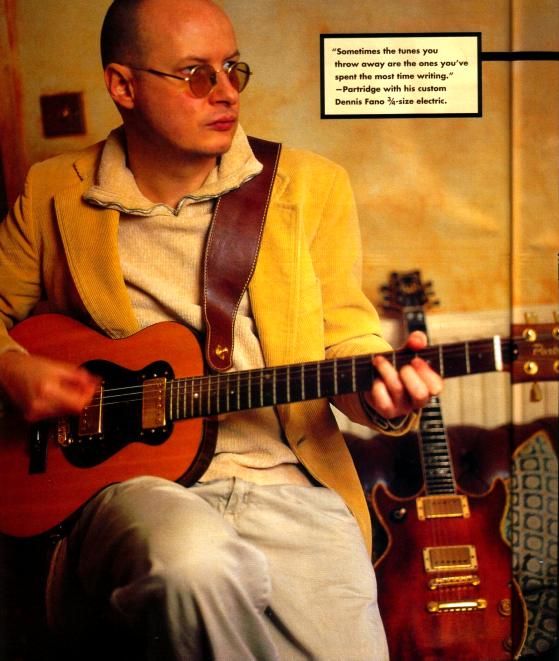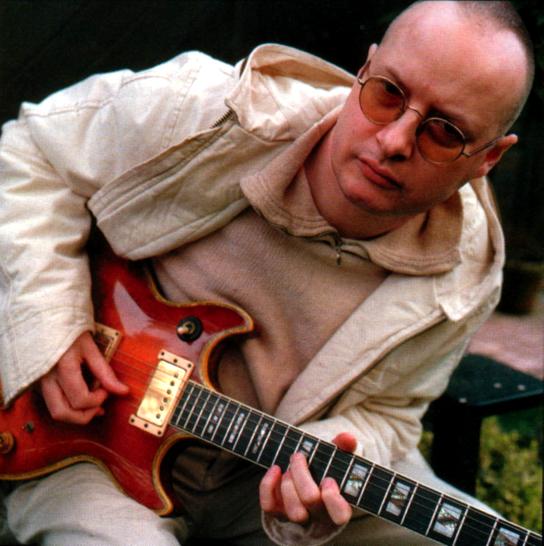GuitarPlayer
July 2000 issue (May 2000)

by Darrin Fox
 |
| "Sometimes, the tunes you throw away are the ones you've spent the most time writing". - Partridge with his custom Dennis Fano 3/4-size electric. |
When guitarist Dave Gregory left XTC last year, the band was recording Apple Venus Volume 1. Gregory's departure left Andy Partridge as XTC's sole guitarist, and some wondered if he could handle the gig in a band known for its highly crafted, guitar-based pop. XTC's latest album Wasp Star (Apple Venus Volume 2) proves that Partridge is up to the task. Over the years, he has managed to evolve into an accomplished player without losing the quirky edge he first displayed on the band's 1977 debut, White Music. Normally self-effacing, even Partridge had to acknowledge success. "I pulled off a few crackers on Wasp Star", he admits. "A couple of the solos are actually all right".
Gregory's departure stalled work on the guitar-oriented Wasp Star, which was supposed to be coupled with the mostly orchestral Apple Venus Volume 1. "Think of each album as being part of a double-CD package", suggests Partridge, "but imagine that it took you a year to find the second disc". In our April '99 issue, Partridge gave GP the lowdown on the first installment of this delayed double album. Here are his thoughts on XTC's latest pop masterpiece.
What was it like to be the only guitarist on Wasp Star?
Initially, it scared the pants off me. I'd become lazy with my playing over the years, and quickly realized I couldn't turn to Dave and say, "You do the fancy bits". Previously I was the cake maker - now I have to do the icing, as well. It was definitely daunting, but I really enjoyed it.
Do you miss having another guitarist in the studio to offer inspiration and ideas?
It's rare that a guitarist inspires me - most bore me by being so staid. However, it's good to work with other musicians who occasionally play something that makes you smile. Sometimes you grin until your face wants to smash. You go, "I would never have thought of that".
The rhythm guitar on Wasp Star is often quite chunky. It's not what comes to mind when I think of XTC.
As years go by, you get less embarrassed by normality, and you become a bit more grounded. You can also play stuff when you're older that would have made you die from embarrassment in the past. But that chunkiness may just be for this album. Who knows?
"Stupidly Happy" is based on a single riff. How do you keep the song from being boring?
If you have music that is unchanging, usually the melody has to change. On that tune, I found three different melodies that work well with each other. The trick was to make sure they all fit. It's like building a clock - all the cogs have to interrelate properly.

How did you know that one riff was all you needed? Weren't you tempted to add other parts?
You know you really have something if it's slightly idiotic, but it still thrills you. I like the idiocy of the unchanging riff. "River of Orchids" [Apple Venus Volume 1] was that way, too.
The solo in "You and the Clouds Will Still Be Beautiful" has a great throbbing tremolo.
Originally I thought there might be too much trem. We recorded two tracks, one dry and one with tremolo, and then mixed them together.
The bluesy lead breaks on "My Brown Guitar" reveal a side of your playing I've never heard before.
I wanted to get a slightly clumsy feel - like youth club rock.
Are all your solos improvised?
Dave Gregory used to write his solos out. I could never do that. I just have to get in the right frame of mind and go until I get a good one. Usually if I don't get it on the first two tries, I have to spend at least 20 minutes fumbling around like a learner until I rediscover where I was coming from. That's the approach that works best for me.
Have you learned new guitar techniques in the past few years?
No. I'm very lazy, and I never practice. I go months without picking up a guitar. Consequently, my technique is not great, but I'm also not backed into a lot of ultra-rehearsed alleyways. I can still find things that are surprising to me. That may not happen if I was "Mr. Slick" and practiced everyday.
 |
| "Pop music is currently as healthy and unhealthy as it has always been", says Partridge, cradling his '75 Ibanez Artist. |
Who would you say is your biggest guitar influence?
Ollie Halsell. His playing on the first two Patto albums really influenced me. I'd never heard anyone play like that-his style was so fluid. He went places other guitarists fear to tread. His whole approach wasn't from guitarland. It owed more to McCoy Tyner or John Coltrane. No self-respecting guitarist should die without hearing Ollie Halsell. Highly recommended. Also, an album that taught me a lot is the Grateful Dead's Live Dead. On "Dark Star", for example, the playing is so slow it's like "play along with Uncle Jerry". That record taught me a lot about scale application as well. It was real easy to play along with, so it gave me a lot of confidence.
Did you use any alternate tunings on this record?
No. It's a phase I go in and out of. For me, new tunings are a perverse way of finding really straight or normal chords. It's good to try a new tuning, though, because in the process you trick your brain into writing a song - or even an album's worth of songs.
What guitars did you use on this record?
For 70 percent of the album, I used a Squier Telecaster. It was always laying around in the studio, and I would show my ideas on it. We'd start dialing up sounds and I'd think, "This guitar sounds really good". I also used my '75 Ibanez Artist and a custom, 3/4-size guitar built by Dennis Fano.
How did you get your tones on Wasp Star?
I used a Line 6 Pod. In fact, we ran everything on the record through the Pod in some way. I can't rate it highly enough. The agony of which amplifier I'm going to use is gone. I would either plug the Pod straight into the board, or pump it through my Sessionette 70 amp and mic that. Miking an amp lets you get a real physical punch in the chest that you sometimes don't get recording direct.
How did you record Wasp Star?
We used Otari's Radar hard-disk system. This album has the most editing we've ever done. It sounds stupid in this day and age, but we thought people were pansies if they edited takes together. On past records, we used whichever rhythm track was mistake-free. We worked like that for years. We really only started editing takes on Apple Venus Volume 1.
How do you think this technology affects music?
Technology shapes people's musical tastes. These days the average person is so tuned into mechanical music that if you played a Rolling Stones album from the early '70s, people would say, "These guys can't play". That's too bad.
On XTC's Black Sea and Drums and Wires, how many guitar parts were Dave Gregory's contributions and how many were suggested by you?
Certain things are pure Dave. If it's an arpeggio-based figure - like "Ten Feet Tall" [Drums and Wires] - it was his idea. My playing is choppier, with more clustery, dense-sounding chordal things. I thought Dave and I complemented each other very well. I was more out there, orbiting around the edge, while he was decidedly centered.
When you're writing, how do you know when you have a keeper?
On a gut level, you know the 'A' stuff within seconds. Although, other times you have to bash away forever before you realize if a song is good or not. Sometimes, the tunes you throw away are the ones you've spent the most time writing.
How do you know when to say, "enough is enough" and stop working on a particular song.
A song has to at least go to the demo stage. You don't know if an idea is going to come out of the air while you're recording. Put different clothing on a song, and you'll suddenly say, "Whoa, this is really happening now"! You'll discover it looks great with a fluorescent yellow trench coat instead of the black swimming trunks it was wearing before.
Do you work out vocal arrangements on the guitar?
Yes - I'm not proficient enough on keyboards.
At what point in the writing process do you begin working out vocal arrangements?
Sometimes they're integral to the tune from the beginning, and act as the fertilizer that makes the song grow. For example, on "I'm the Man Who Murdered Love", the main melody is too idiotic to survive on its own, but I liked it. Creating a vocal arrangement around the melody allowed it to stand up all through the song. Other times, you just get a feeling. On "You and the Clouds", Colin [Moulding, XTC's bassist] thought there should be something that opens up and really fans out the song. He sang a note and I said, "Now sing this note and this note". Within two minutes, we came up with a glowingly dissonant four-part harmony that introduces the last group of choruses.

Have you ever resurrected a song that you thought was horrible?
No. If it's horrible, I just flush it down. However, I've resurrected songs that everyone else thought were awful, but I believed in them. "I'm the Man Who Murdered Love" was one of those. That was written at the tail end of the Nonsuch sessions. I really believed in that tune, but no one wanted to do it. My persistence paid off.
How do you keep from repeating yourself as a songwriter?
I repeat myself, but usually only with lyrical themes rather than chord changes. I find myself repeating topics like never earning enough money, the cycle of life and death, and goofy love.
People say, "XTC uses the same chords and scales as anyone else, yet they sound totally original". How do you explain that?
The chords may sound somewhat normal, but we play inversions that are particular to us. For example, every time I play an E chord, I play it with a G# on the bottom. It sounds warmer to me. Also, when I play an A chord, I tend to play the high-E string's F#, so I end up with an A6. I also can't play a D chord without playing the F# on the bottom. I like the big roundness of that inversion. Although these are bad habits, they're a big part of our sound. So, in a way, we do play the same chords as everyone else - but with a slight twist.
Do you consciously strive for hooks when you write?
If a melody is not inherently hooky, I'll probably throw it away. I look at melody as a skyline. It goes up, up a little more, straight down, and then up again. Songs that don't do that annoy me. They don't go anywhere. I have to make hooky melodies [sings] that go up and down. It's a compulsion.
Go back to Chalkhills Articles.
[Thanks to David Oh]